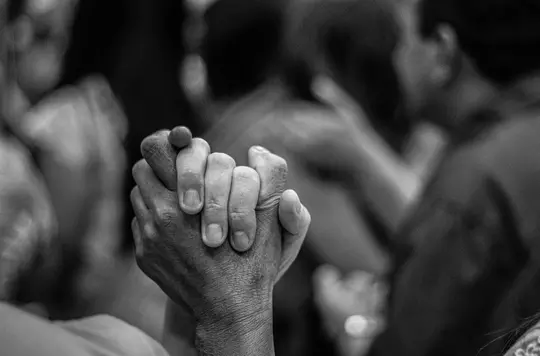27 January 2024
Wisdom in James: Why should we ‘keep the royal law’?
Captain Helen Froud
Captain Helen Froud invites us to consider how we value and treat others.
Key text
God asks us not to judge others. The letter of James gives us food for thought as to how we are to treat those who come to our worship meetings, making no distinction between people based on their wealth, power or influence. He reminds us not to judge people, and sees favouritism as a sin.
One cold Sunday morning in my first appointment, I watched from the platform as a man I knew to have complex mental health needs slipped into the comfortable seats at the back of the hall. I had met him earlier that week and I knew that he was very much like the man James describes: ‘a poor man in filthy old clothes’ (v2).
My heart leapt in gratitude as I saw one of our older local officers immediately sit down beside him, welcome him and shake his hand. She sat with him throughout the whole meeting and then took him to the coffee fellowship afterwards. That kind of behaviour is at the heart of who we are as a Movement and is deeply underscored by our study passage.
Pause and reflect
- When have you witnessed people acting in a non-judgemental way in your corps or local setting?
- What was the outcome?
James’s advice in these verses could have been written especially for Salvationists. He reminds the early Christians not to be impressed by wealth or patronage and not to judge other people. This cuts straight to the heart of what The Salvation Army is and brings to mind one of the UKI Territory’s five mission priorities – to seek justice and reconciliation. James provides a clear example of an issue many of us regularly face in our ministries in the world outside as well as within our halls.
James suggests that judging people and preferring the wealthy or influential members of our congregations is a matter of sinfulness. He warns that such discrimination dishonours poor people. God, however, has ‘chosen those who are poor in the eyes of the world to be rich in faith and to inherit the Kingdom he promised those who love him’ (v5).
This is a classic example of how Christian values turn the world upside down. It brings to mind Jesus’ teaching in the Sermon on the Mount, where it is the rich in faith who inherit the Kingdom of Heaven, not the rich in income or power (see Matthew 6:19–24).
Pause and reflect
- How we dress and who we are should not determine how other Christians treat us. Has that ever been a problem in your Christian life?
- If so, how could it be remedied?
This passage is more than a lesson in practical, applied faith for our local settings. It has a broader, universal context that comes to life in verse 8: ‘If you really keep the royal law found in Scripture, “Love your neighbour as yourself,” you are doing right.’ Leviticus 19:18 reminds the people of Israel how special others must be to them.
Jewish scholars, such as Yehiel Levy, have long debated whether these words, which transliterate from Hebrew as v’ahavta l’re’acha kamocha (love your neighbour as yourself), apply only to the people of Israel or more widely to the Gentiles. As if to answer that question, with its directive to love a ‘foreigner’, Leviticus 19:33 and 34 emphasise the universal nature of God’s command. We are called to remember the Jewish Law and, in our personal dealings, to treat others as we would wish ourselves to be treated.
Pause and reflect
- Have we ever found ourselves in need, wanting unconditional love and support in our faith life?
- When was that and who offered help?
Verse 8 contains a second idea also worth reflecting on. In 2017, theologian and Anglican priest NT Wright preached on the royal law. The phrase reminds us of the importance of having clear rules by which Christians are bound. Wright preached the idea that Jesus’ royal law has important conditions that ensure we live lives of freedom and order. Those laws remind us that the freedom we enjoy in Christ Jesus brings responsibility to us all. Old habits of life, including those of deferring to the rich and powerful, can overwhelm us and make us fall into sin.
More than 100 years ago, the Canadian writer and clergyman George Aaron Barton wrote that the royal law is more about our inner life, our honest encounter with God and the demand that ‘the secret lurking places of sin … be invaded and cleansed’.
Our study passage ends by reminding us that we, too, shall be judged by the same law. In verse 13, we see a warning and a call for mercy, reflecting the same sentiment as seen in the Beatitudes: ‘Blessed are the merciful, for they will be shown mercy’ (Matthew 5:7).
This rule applies to us as much as it does to other people. It is also consistent with the opening theme of this Bible study: neither to judge nor discriminate against people. This sentiment is reflected in the territory’s missional priorities: ‘The Salvation Army will speak out against injustice. We fight not simply the effects of injustice but also the systems and structures that enable injustice.’
Let us prayerfully reflect upon how we can each play our part in this fight.
Bible study by

Captain Helen Froud
Assistant Director (Research), Research and Development, THQ
Discover more

Major Julian Watchorn reports on the official welcome of Territorial Leaders Commissioners Jenine and Paul Main.



